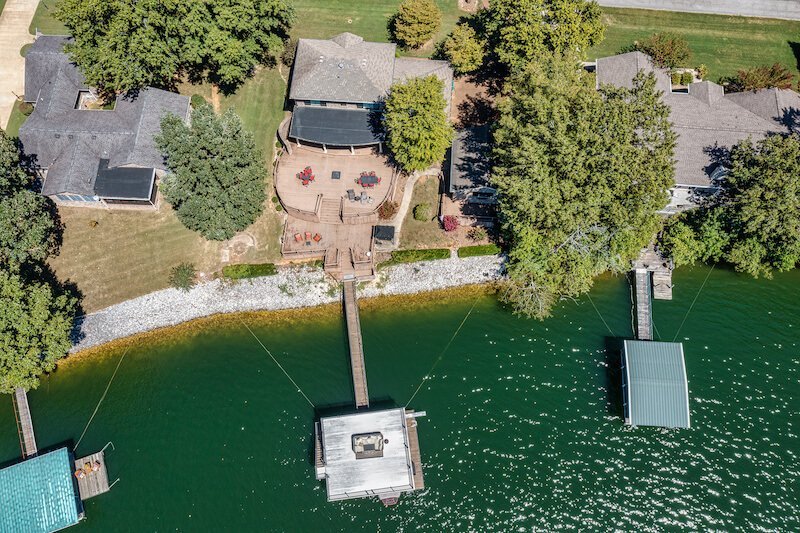5 Things to Know Before Buying a Waterfront Property
Posted by Gary Ashton on Tuesday, October 24th, 2023 at 9:45am.

Dreaming of owning a lakefront home? Carefully crunching the facts can help you make an informed decision. From boundaries to building a dock, from flooding to insurance, understanding the waterfront before you buy can save you from costly surprises. So, be sure to consider these crucial questions before you commit to your waterfront paradise.
What Are the Waterfront Ownership Boundaries?
When buying a waterfront property, it's important to understand the waterfront ownership boundaries, including riparian and littoral rights.
Riparian rights are the rights of a landowner with property adjacent to a river or stream. This means they have the right to use the water, such as fishing, swimming, and boating, and they may also be able to access the water for irrigation and other uses. Littoral rights are the rights of a landowner who has property adjacent to a lake or ocean. Additionally, littoral rights may also entitle the landowner to access the shoreline for the purpose of docking boats or other watercraft.
In some cases, riparian and littoral rights may be combined, meaning the landowner has access to both the river or stream and the lake or ocean. It's important to understand the rules and regulations that govern waterfront property ownership before making a purchase, as this will help you determine what activities are allowed on the property and what restrictions may be in place.
Has the Home Ever Flooded?
Before buying a waterfront property, it is important to ask if the home has ever flooded. Floods can cause significant damage to the structure of a home, leading to costly repairs and further vulnerability to future damage. Even if repairs have been made, it’s still good information to know.
It is also important to check if the home is in a flood zone. Knowing this information can help you understand the risk of flooding in your future home and determine if it is worth the investment. It can also help you to understand the required insurance coverage and other considerations that may be needed. Make sure to get all of the facts and understand the risk of future flooding.
Can I Build a Dock?

Do you need a dock permit to build a dock at your waterfront home? Depending on where you live, the answer might be yes. Before you start planning to build a dock, it's important to find out the regulations for your state, county, city, or homeowners association. An online search can be a great place to start.
The criteria for dock permits can vary widely. You may need to get more than one permit, and you may have to provide public notification. Permits may even be required for routine dock maintenance. It's important to make sure you understand all the regulations and paperwork involved with getting a dock permit.
To get a better idea of what you need to do, you should check with your local building department or any other relevant agencies. They can tell you what permits you need to apply for, and what the process looks like. It's also worth consulting with a local contractor who can help you navigate the process.
What's the Water Quality Like?
It's important to check the water quality in the area where you're considering living. Buying waterfront property can be a great investment, but it's important to make sure you know what you're getting yourself into. Water quality can vary greatly from one area to the next, so it's essential to research the area and understand what kind of water you will be dealing with.
You'll want to check out the local water quality reports for things like the pH level, the levels of nutrients, and what kind of bacteria and pollutants are present in the water. Knowing the water quality of an area can help you determine if it's a safe place to live and if you can use the water for recreational activities.
Plus, think about how the water quality affects the environment. Poor water quality can lead to algae blooms or aquatic life being put at risk. This can cause a disruption to the local ecosystem and affect the health of the water in the area. Making sure the water quality is high is essential for preserving the natural beauty of the area.
It is also important to evaluate the water quality when it comes to the value of the property. Poor water quality can make it harder for you to find a buyer, so it's important to make sure you know what you're getting yourself into before you invest in waterfront property.
Do I Need Extra Insurance?
Extra insurance when purchasing a waterfront property could prove essential to protecting yourself and your investment in the long term. Flood insurance is a must if the property falls within a designated flood zone, and in many cases, it might even be required. In hurricane-prone or other stormy areas, windstorm insurance covers damage caused by wind and should also be considered.
Be sure to read all the fine print when purchasing any type of insurance, so you know exactly what's covered and what's not. Lastly, check with your local insurance companies or state programs to get quotes on the coverage you need. That way, you can compare prices and find the best deal.
Know What Waterfront Property Ownership Means for You
Buying a waterfront property is a big decision, and it's important to do your homework. Ask yourself the questions outlined above, as well as any relevant local regulations. Taking the time to do your research can help you make an informed decision that will bring you years of joy and comfort as you enjoy living in a community with beautiful water views.

Gary Ashton
The Ashton Real Estate Group of RE/MAX Advantage
The #1 RE/MAX team in the World!
